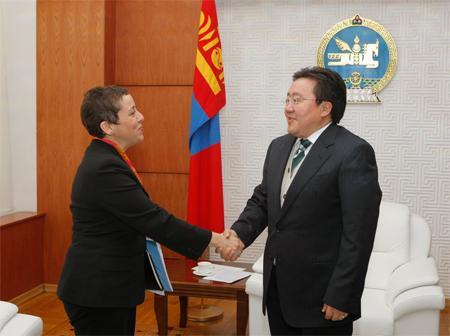ID :
234525
Mon, 04/02/2012 - 14:38
Auther :
Shortlink :
https://www.oananews.org//node/234525
The shortlink copeid
MS. SINANOGLU ABOUT UPCOMING REGIONAL CONFERENCE

Ulaanbaatar, Mongolia, /MONTSAME/ The UNDP Resident Representative in Mongolia Ms. Sezin Sinanoglu speaks about a regional conference "Asia's women underrepresented in politics" to be run to chart a path for change.
"While the world's attention focuses on Myanmar's elections this week, we should not lose sight of a more regional concern about women's political participation in Asia and the Pacific. This part of the world has the distinction of having the lowest percentages of women in national legislatures of any region outside of the Arab states.
"Women remain sidelined from the key governing bodies that determine political and legislative priorities. Roughly 18.2 percent of national legislature seats in Asia are held by women, and only 15 percent in the Pacific. If you exclude Australia and New Zealand, it drops to just five percent. This is a dismal picture. Globally, less than 20 percent of the world's parliamentary seats are occupied by women.
"Why does it matter if women are so poorly represented? Women's perspective and their participation in politics are prerequisites for democratic development and contribute to good governance. Moreover, Asia is home to two-thirds of the world's population, but economic progress will be limited without equal opportunity for men and women to influence political and economic decisions.
"To help address the issue of political equity in Asia, the UN Development Programme (UNDP) and the National Committee on Gender Equality of the Government of Mongolia are organizing a meeting this week in Ulaanbaatar to draw on collective regional experiences to assist more than 12 countries in improving women's political involvement. Members of parliament, officials from political parties, representatives of government ministries, and civil society organizations are convening to devise plans for equity in political participation in their respective countries.
"While such plans require tailoring to national needs, there are some basic prescriptions that could set the scene for more political equality. Such formulas could include establishing consensus among party leadership to promote women's electoral participation and consider adoption of voluntary party quotas for women candidates; provide women with skills to raise early money, campaign and build name recognition; build their abilities to campaign and consider twinning or mentoring of first time candidates; promote the participation of women in policy-making of the party.
"Women are well represented at the grassroots levels of political parties, they are mobilized as polling officers and campaigners during elections, but very few women occupy leadership positions in those parties. While the number of women members of parliaments has been slowly growing, we are still far from reaching the United Nations Millennium Development Goal target of at least 30 percent by 2015.
"It is timely that Mongolia is hosting this regional conference on women's political participation because its parliamentary elections are scheduled for June. The country's parliament voted last year to reform the electoral system and introduce a 20 per cent quota form women candidates in political parties. But a quota alone will not get women elected nor ensure them a seat in parliament.
"In general, political parties need to embrace women candidates and actively promote them. Women need more visibility and access to media and support during the campaign period. Fundamental changes such as campaign financing and political party reforms are needed in the political system, along with changes in public perceptions about women and their roles in government.
Gender equality in political participation is socially just and basic to the notion of democracy. A political system - elected offices, but also other positions that influence public decision - where half the populations cannot fully participate, defies the meaning of democracy.
"While the gathering in Mongolia is an important step toward charting national plans to advance women's political participation, the real work begins at home in encouraging women to step forward and take their rightful place in decision-making. Without access to established networks of influence, and with very limited resources, few role models and mentors, and sometimes even limited family and community support, it is understandable that women's participation in the political arena has remained woefully behind that of men."





